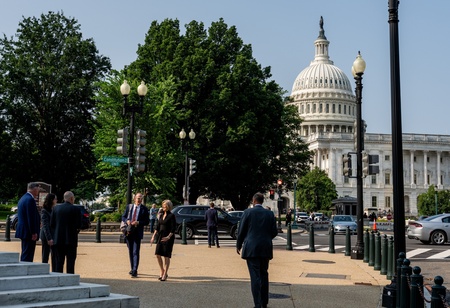
BRICS Set to Condemn 'Coercive' Tariffs, Draft Statement Shows


The leaders of BRICS are about to take a stance that differs from that of US President Donald Trump about trade tariffs, the Middle East conflict, and the necessity of addressing climate change.
Leaders would express "serious concern" regarding unilateral tariff and non-tariff measures.
The implementation of "unilateral coercive measures that are contrary to international law" will also be denounced by the government leaders.
Following the US president's unilateral tariffs imposed on nations globally, the top emerging-market countries are unmistakably referring to the US.
Ahead of Trump's July 9 deadline for the tariffs to go into effect, countries—including India, the founding member of BRICS—are scrambling to reach agreements with the US in order to avoid punishing charges.
However, the unwillingness to take on Trump head-on reflects differences within the group, with some countries—like India—being closer to Washington than others due to worries that BRICS could be used as a platform for China, the bloc's largest member economy.
However, the BRICS countries, which Brazilian President Luiz Inacio Lula da Silva hosted in Rio de Janeiro, disagree with the Trump administration on a number of policy issues.
This covers the Middle East, where the draft language makes several allusions to Israel's conflict with Hamas in Gaza.
Also Read: Mixed Thoughts Unfurl Among Leaders Globally Over Trump's Tariff Pause
The leaders might voice "severe concern" over the state of affairs in Palestinian territory, pointing to the restart of Israeli attacks and the blockade of humanitarian supplies into Gaza.
Regarding accusations made against Israel, which it denies, the wording in question includes a denunciation of the use of famine as a weapon of war.
According to the authorities, BRICS leaders are also anticipated to push for global control of artificial intelligence to reduce possible threats and to show support for the Paris climate deal, which Trump unilaterally renounced.
Also Read: Spacetech Startups Propelling Modern Space Innovation
The US is at the forefront of the AI race and is resisting attempts by the European Union and others to regulate the technology. In addition to the more recent full members Egypt, Ethiopia, Iran, Indonesia, and the United Arab Emirates, the BRICS countries include Brazil, Russia, India, China, and South Africa. A further ten countries, including Kazakhstan, Nigeria, Vietnam, and Thailand, will be welcomed as partners in the declaration.

